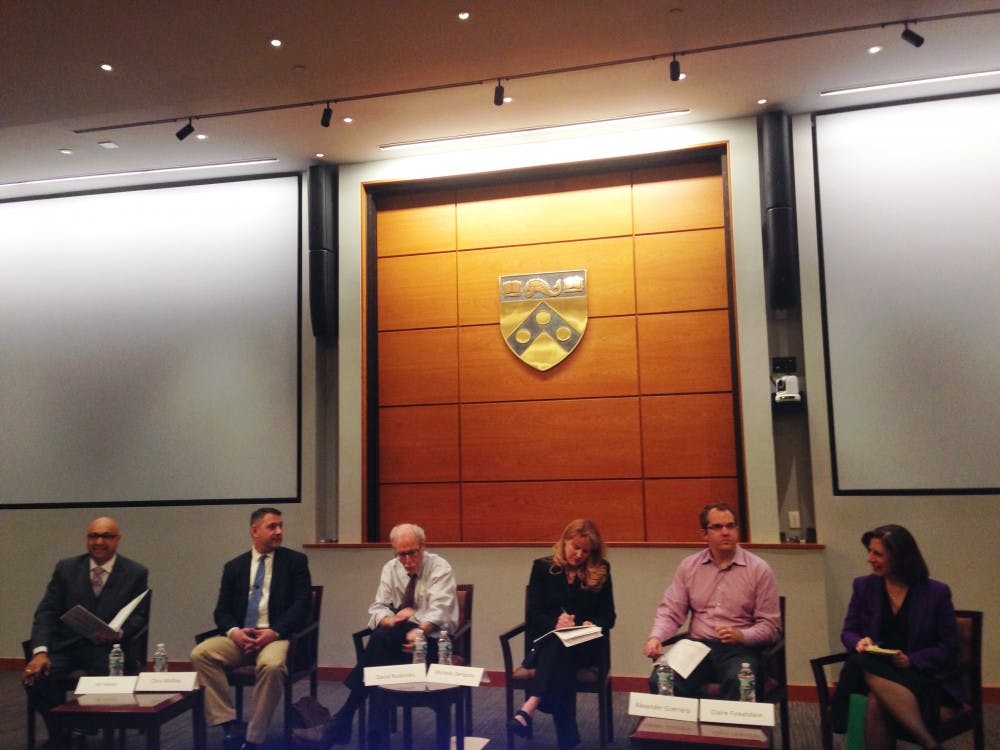
Law professors and experts on sexual assault held a panel discussion on Wednesday regarding how Penn has changed the way sexual assault and misconduct cases are handled on campus.
Credit: Elizabeth Winston | Staff ReporterAre Penn’s new sexual assault policies fair to both the accusers and the accused?
Penn Law professors and experts on sexual assault took part in a panel discussion on Wednesday about the University’s handling of sexual assault and misconduct cases. The event, titled “With Justice for All: Investigating Campus Sexual Assault,” was a collaboration between the Evelyn Jacobs Ortner Center on Family Violence and the Quattrone Center for the Fair Administration of Justice. It was moderated by Ali Velshi, host of Al Jazeera America’s “Real Money with Ali Velshi.”
The panel addressed how Penn’s actions have affected sexual assault victims and perpetrators. Panelists held varied views, but agreed that there is still more to done on the issue.
In a response to a call to action from the Obama Administration, Penn has made several changes to how it handles sexual assault this year. In February, the University hired Christopher Mallios as a sexual violence investigation officer and relaxed the requirements for proving that sexual assault had occurred. Sixteen Penn Law professors made national headlines when they penned a letter to the University’s administration, criticizing the policies for not offering enough due process to the accused.
Mallios sat on the panel along with five others.
David Rudovsky, a criminal law professor and one of the letter’s authors, pointed out that, even if a perpetrator is not expelled from the University, “This is a life-changing event for someone found guilty.” He added that this holds true for those who are wrongly accused as well.
Rudovsky went on to criticize the fact that in sexual misconduct hearings, there are no cross examinations of witnesses, which may lead to an inaccurate portrayal of the events in question. He claims that when it comes to the question of sexual misconduct, it is easy to dilute the protection for those who we believe have done wrong.
Penn is not the only university that runs hearings without cross examinations. “Very few campuses have ever provided cross examinations at academic hearings,” said Claire Finkelstein, a Penn Law professor and chair of Faculty Senate. Finkelstein went on to explain that because the hearings for sexual misconduct are done through the University they do not give those involved the same rights that they would have in a criminal trial.
“Due process is based on substantive law of the University,” she added. In other words, she said the constitutional right of due process is only guaranteed in a trial by the state, not a private institution such as Penn.
Campus culture and how it contributes to the difficulty of accountability was another hot-button issue. Some voiced concern that excessive consumption of alcohol at parties may contribute to situations that facilitate sexual misconduct.
“Penn has failed at changing the culture,” Rudovsky said.
Villanova University School of Law professor Michelle Dempsy rebutted his argument.
“Alcohol doesn’t cause rape, rapists cause rape,” Dempsy said. “Alcohol is used as weapon to accomplish an assault.”
Looking at a philosophical perspective, Penn professor Alexander Guerro pointed out that hearing procedures that give the benefit of the doubt to either side make the process unfair. He said that people may often stereotype based on gender, adding another level of difficulty in reaching a resolution to a given case.
The Daily Pennsylvanian is an independent, student-run newspaper. Please consider making a donation to support the coverage that shapes the University. Your generosity ensures a future of strong journalism at Penn.
DonatePlease note All comments are eligible for publication in The Daily Pennsylvanian.








